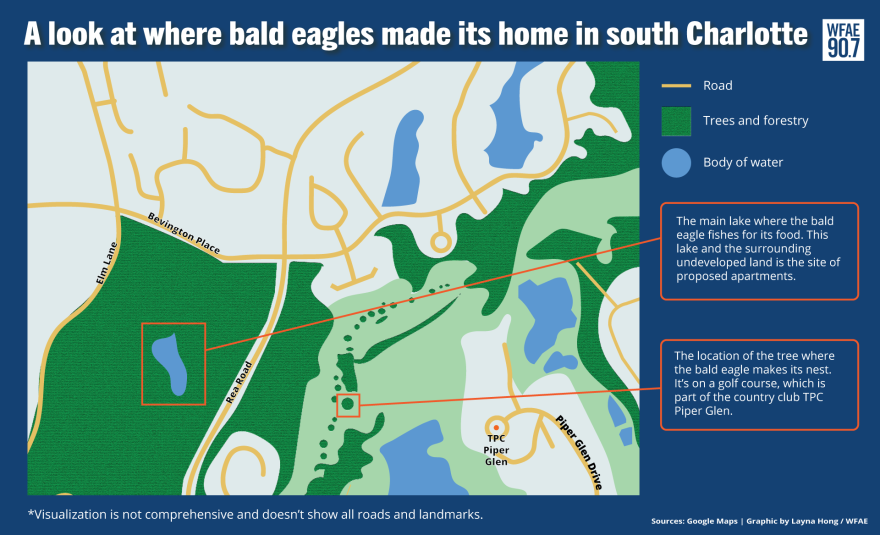It's a peaceful day on the TPC Piper Glen golf course in south Charlotte. A line of golfers practice their swings on the driving range as residents Chris McIntire and his wife, Ellie, stroll along the grass behind them.
Chris points to the sky, and Ellie raises her binoculars. Above them, a bald eagle swoops into view.
"That is Glen, right there, flying in," Chris says.
"Yep, one of them is flying in. Just landed," Ellie adds.
The eagle's nickname is Glen, the McIntires say, and his mate is Piper. The bird swoops into a tree in the middle of the golf course and perches beside a big nest of sticks and twigs.
"Probably brought lunch, or dinner," Chris says.
"Yeah, it's dinner," his wife says, looking through her binoculars.
The McIntires have lived on this golf course for 28 years. It's a generally quiet, safe and wealthy enclave, where the median household income of the area is almost twice as much as that of the county as a whole. They think the eagles have lived here for at least 12 years, raising eaglets every spring and catching fish in nearby ponds.
But the McIntires worry one of those ponds is threatened by a plan to build a six-story, 1,100-unit apartment community across from the golf course on land that's currently undeveloped.

"We're fearful not just for [the eagles], but for all the wildlife — the deer, the coyotes, the beaver, the owls, the Canadian geese that you see here in front of you," the husband said.
So, he started a petition, titled "Save the Eagles — Request Charlotte City Council vote NO on Rea Road Rezoning." But he says it's not just about the wildlife.
"We've also got to consider the traffic, the infrastructure, the strain on the streets," he said.
Opposition to new developments from neighbors worried about the infrastructure's ability to support an influx of people is common. A mating pair of eagles as the face of that opposition is not. So far, about 8,500 people have signed the petition. It asks the city to block the apartments, and keep the area zoned for single-family homes that won't "dramatically alter the character of the neighborhood."
Carolina Raptor Center weighs in
Inside the Carolina Raptor Center in Huntersville, President and CEO Erin Katzner checks on a pair of disabled eagles in an enclosure. She said Mecklenburg County has more bald eagles than you might think.
"I know that we have some on Mountain Island Lake, there's some up on Lake Norman. If there's good habitat, there's very likely to be bald eagles nesting in the area," she said.
The last measurement of Charlotte’s tree canopy found it has shrunk to cover 45% of the city, down from 49% a decade ago. Katzner said habitat loss is a concern, but also said bald eagles are skilled at adapting.
"You know, I've seen bald eagles live in fairly developed areas, and fairly undeveloped areas, so it's really hard to say if it's going to be an issue for those birds, and what exactly would need to be done to prevent it from being an issue," she said.
She thought there were a few steps the developer could take.
"If it were me, I would probably want to protect that lake, protect that water system, which I imagine they would want to anyway, and ensure that some of those large trees remain standing," she said.

Developer says lake, open space will remain
When contacted by WFAE, developer Russell Ranson of RK Investors said his team was planning to do exactly that.
"We absolutely plan to preserve the lake, as well as a strong perimeter of trees that should fully disguise our buildings," he said.
Ranson said his team only wants to dredge the pond and maybe install a fountain, while keeping the fish in place.
He also said he hopes to preserve 40% of the land as open space for wildlife and walking trails, and said the impact on traffic would be minimal, according to a traffic study.
"I would just say we've been very thoughtful, and we look forward to visiting with the neighbors and hearing their thoughts and concerns. At the same time, we're trying to provide opportunity for a lot of families that need housing in this area," he said.
More than 200,000 people are projected to move to Mecklenburg County by 2030, according to the U.S. Census. Ranson said if the city wants to accommodate that growth — and doesn't want real estate prices to keep skyrocketing — then Charlotte needs to keep building.
Correction: This story has been corrected to note that 200,000 people are expected to move to Mecklenburg County, not the city of Charlotte.


